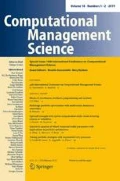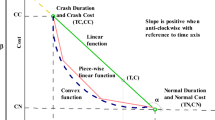Abstract
Determining discrete time-cost tradeoffs in project networks allows for the control of the processing time of an activity via the amount of non-renewable resources allocated to it. Larger resource allocations with associated higher costs reduce activities’ durations. Given a set of execution modes (time-cost pairs) for each activity, the discrete time-cost tradeoff problem (DTCTP) involves selecting a mode for each activity so that either: (i) the project completion time is minimized, given a budget, or (ii) the total project cost is minimized, given a deadline, or (iii) the complete and efficient project cost curve is constructed over all feasible project durations. The DTCTP is a problem with great applicability prospects but at the same time a strongly \({\mathcal N}\,P\)-hard optimization problem; solving it exactly has been a real challenge. Known optimal solution methodologies are limited to networks with no more than 50 activities and only lower bounds can be computed for larger, realistically sized, project instances. In this paper, we study a path-based approach to the DTCTP, in which a new path-based formulation in activity-on-node project networks is presented. This formulation is subsequently solved using an exact cutting plane algorithm enhanced with speed-up techniques. Extensive computational results reported for almost 5,000 benchmark test problems demonstrate the effectiveness of the proposed algorithm in solving to optimality for the first time some of the hardest and largest instances in the literature. The promising results suggest that the algorithms may be embedded into project management software and, hence, become a useful tool for practitioners in the future.
Similar content being viewed by others
References
Akkan C, Drexl A, Kimms A (2005) Network decomposition-based benchmark results for the discrete time-cost tradeoff problem. Eur J Oper Res 165(2): 339–358
Brucker P, Drexl A, Mohring R, Neumann K, Pesch E (1999) Resource-constrained project scheduling: notation, classification, models, and methods. Eur J Oper Res 112(1): 3–41
Crowston WB (1970) Decision CPM: network reduction and solution. Oper Res Q 21(4): 435–452
Crowston W, Thompson GL (1967) Decision CPM: a method for simultaneous planning, scheduling, and control of projects. Oper Res 15(3): 407–426
De P, Dunne EJ, Ghosh JB, Wells CE (1995) The discrete time-cost tradeoff problem revisited. Eur J Oper Res 81: 225–238
De P, Dunne EJ, Ghosh JB, Wells CE (1997) Complexity of the discrete time-cost tradeoff problem for project networks. Oper Res 45(2): 302–306
Demeulemeester EL, Herroelen WS (2002) Project scheduling: a research handbook. Kluwer, Boston
Demeulemeester EL, Herroelen WS, Elmaghraby SE (1996) Optimal procedures for the discrete time cost trade-off problem in project networks. Eur J Oper Res 88(1): 50–68
Demeulemeester E, De Reyck B, Foubert B, Herroelen WS, Vanhoucke M (1998) New computational results on the discrete time/cost trade-off problem in project networks. J Oper Res Soc 49(11): 1153–1163
Dongarra JJ (2008) Performance of various computers using standard linear equations software (Linpack Benchmark Report). Computer Science Technical Report, CS-89-85, University of Tennessee
Elmaghraby SE (1993) Resource allocation via dynamic programming in activity networks. Eur J Oper Res 64(2): 199–215
Harvey RT, Patterson JH (1979) An implicit enumeration algorithm for the time/cost trade-off problem in project network analysis. Found Control Eng 6: 107–117
Herroelen W, Demeulemeester E, De Reyck B (1999) A classification scheme for project scheduling problems, chap 1. Kluwer, Amsterdam, pp 1–26
Hindelang TJ, Muth JF (1979) A dynamic programming algorithm for decision CPM networks. Oper Res 27(2): 225–241
Kelley JR, Walker MR (1959) Critical path planning and scheduling: an introduction. Mauchly Associates, Inc., Ambler, Pennsylvania
Kolisch R, Padman R (2001) An integrated survey of deterministic project scheduling. Omega 29(3): 249–272
Kolisch R, Sprecher A, Drexl A (1995) Characterization and generation of a general class of resource-constrained project scheduling problems. Manag Sci 41(10): 1693–1703
Meyer WL, Shaffer LR (1963) Extensions of critical path method through the application of integer programming. Civil Engineering and Construction Research Series, University of Illinois, Urbana-Champaign, Illinois
Robinson DR (1975) A dynamic programming solution to cost-time tradeoff for CPM. Manag Sci 22(2): 158–166
Skutella M (1998) Approximation algorithms for the discrete time-cost tradeoff problem. Math Oper Res 23: 992–1020
Vanhoucke M, Debels D (2007) The discrete time/cost trade-off problem: extensions and heuristic procedures. J Sched 10(4–5): 311–326
Author information
Authors and Affiliations
Corresponding author
Rights and permissions
About this article
Cite this article
Hadjiconstantinou, E., Klerides, E. A new path-based cutting plane approach for the discrete time-cost tradeoff problem. Comput Manag Sci 7, 313–336 (2010). https://doi.org/10.1007/s10287-009-0115-6
Received:
Accepted:
Published:
Issue Date:
DOI: https://doi.org/10.1007/s10287-009-0115-6




